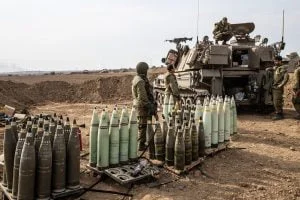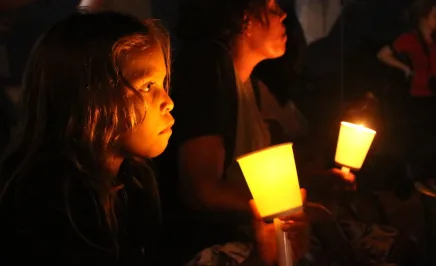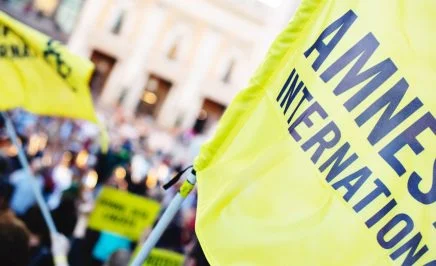Amnesty International has documented patterns of serious violations of international human rights and humanitarian law in Israel and the Occupied Palestinian Territories for decades. Through hundreds of interviews with survivors and eyewitnesses, open-source investigations including image and weapons analysis and examination of satellite imagery, along with an assessment of a variety of other sources, Amnesty International has documented evidence of war crimes committed by all parties to the most recent conflict in Israel and the Occupied Palestinian Territories using a wide variety of arms1.
Since 7 October the Israeli Air Force has used advanced combat aircraft – F-15s, F-16s and F-35s – armed with general purpose bombs and guidance kits, such as Joint Direct Attack Munitions (JDAMs), as well as drones armed with guided missiles in air strikes on the occupied Gaza Strip. The Israeli navy has also been used to strike Gaza from the Mediterranean, as well as firing on Palestinian fishing boats. Israeli ground forces are equipped with armoured fighting vehicles, including battle tanks, large calibre artillery systems, and related munitions, mortars, and small arms and light weapons, supported by attack helicopters. Hamas and other armed groups have used unguided – often makeshift – rockets, as well as small arms. In short, all categories of weapons in the Arms Trade Treaty’s (ATT) scope have been deployed during the conflict2.
Amnesty International has documented the use by the Israeli military of US-made JDAMs in two deadly, unlawful air strikes on homes full of civilians in the occupied Gaza Strip which killed 43 civilians – 19 children, 14 women and 10 men – on 10 and 22 October 2023; as well as the use of a GBU-39 Small Diameter Bomb, made in the US by Boeing, in an Israeli strike in January 2024 which hit a family home in the Tal al-Sultan area of Rafah, killing 18 civilians. The US continues to be the largest supplier of military aid to Israel4. War crimes committed during the outbreak of conflict since 7 October 20233 by Israeli forces include direct attacks on civilians and civilian objects and indiscriminate attacks.
Hamas has confirmed that it received US$70 million in military aid from Iran5. Analysis of weapons captured on the battlefield by Israel suggest Hamas is using various types of rocket-propelled grenades and a mix of older and more recent AK-pattern rifles (“Kalashnikov”). There is a domestic artisanal industry manufacturing low-quality, improvised rockets which are impossible to accurately target, which reportedly includes the recycling of unexploded Israeli munitions. Hamas and other Palestinian armed groups have committed war crimes including the deliberate killing of civilians, hostage-taking and launching indiscriminate rocket attacks into Israel.
These alleged war crimes have involved combat aircraft, general purpose bombs and guidance systems, drones, artillery, naval vessels and small arms and light weapons, among other types of weapons and military equipment.
The Arms Trade Treaty and State Obligations
Article 6 of the ATT prohibits transfers if the state party “has knowledge at the time of authorisation that the arms or items would be used in the commission of genocide, crimes against humanity, grave breaches of the Geneva Conventions of 1949, attacks directed against civilian objects or civilians protected as such” or other war crimes. If the export is not prohibited under Article 6, states parties must carry out an “objective and non-discriminatory” risk assessment under Article 7, barring the export of weapons where there is an “overriding” risk that they “could be” used to commit or facilitate a serious violation of international human rights or humanitarian law.
States which continue to transfer arms to Israel or Hamas and other Palestinian armed groups with knowledge that the recipient is using these arms to commit “internationally wrongful acts” – which include crimes under international law such as war crimes, genocide and crimes against humanity – are themselves at risk of aiding and assisting in those wrongs.
The International Court of Justice, the Geneva Convention and State Obligations
On 29 December 2023, South Africa brought a case against Israel at the International Court of Justice (ICJ) under the Convention on the Prevention and Punishment of the Crime of Genocide over allegations of genocide against the Palestinian people. Amnesty International has warned of the risk of genocide in Gaza due to the shockingly high death toll among Palestinians, the widespread destruction caused by Israel’s relentless bombardment and the deliberate denial of humanitarian aid as part of the ongoing illegal blockade which are all inflicting horrifying levels of suffering on Gaza’s civilian population. Other warning signs include the increase in racist and dehumanising rhetoric by Israeli government officials, including Israeli Prime Minister Benjamin Netanyahu, and Israel’s history of oppressing and discriminating against Palestinians under its system of apartheid.
On 26 January, the ICJ issued a ruling which ordered six provisional measures including for Israel to refrain from acts under the Genocide Convention, prevent and punish the direct and public incitement to genocide, and take immediate and effective measures to ensure the provision of humanitarian assistance to civilians in Gaza. All states have a clear duty to ensure these measures are implemented and to adopt conduct that prevents the commission of genocide.
This was followed by the ICJ’s recent Advisory Opinion on the legality of Israel’s occupation, which found that states are “under an obligation not to render aid or assistance in maintaining the situation created by Israel’s illegal presence in the Occupied Palestinian Territory.”6
In addition to this, under common Article 1 of the Geneva convention7, all countries have a legal duty to ensure respect for international humanitarian law by the parties to any armed conflict in any country. This principle also arises under customary international humanitarian law, and requires governments to both take action, but also to halt actions, such as the transfer of arms, if it is expected that a country would use those arms to violate international humanitarian law. This principle also requires states to take steps to prevent the onward or secondary transfer of arms, meaning they must conduct a risk assessment which covers human rights risks related to the end use/user in the final importing state.
The Arms Trade Treaty and Australia
After more than 20 years of campaigning by Amnesty International and partner NGOs, the ATT became international law on 24 December 2014. Any state that is a party to the treaty has strict legal obligations in relation to international arms transfers. The ATT was designed to stop deadly weapons from getting into the hands of people who will use them to commit serious human rights violations, including genocide, crimes against humanity and war crimes. Australia signed the ATT at New York on 3 June 2013 and ratified it on 3 June 2014.
As a pivotal player regarding the regulation of the international arms trade, Australia made progress in this space as a centrepiece of its time on the Security Council. As co-author of the original General Assembly Resolution, and chair of the treaty negotiations, in 2014 then Foreign Minister Julie Bishop “acknowledged the leadership of Australian officials in guiding the Arms Trade Treaty from that first resolution in 2006 to its successful conclusion in 20138.” Yet despite this leadership role, Australia’s own system to manage defence exports leaves a lot to be desired and has been labelled by many as one of the most opaque systems in the world when compared to peer countries.
To fulfil Australia’s obligations under the ATT, Australia relies in part on the Defence Trade Controls Act 2012, which “controls the supply, publication and brokering of tangible and intangible military and dual-use goods and technologies” which are included on the Defence and Strategic Goods List. The Department website states that “prior to issuing a permit, the Minister for Defence or a delegate must consider certain assessment criteria that are listed in both the Defence Trade Controls Act 2012 and the Defence Trade Controls Regulations 2013 to assess whether the export would prejudice Australia’s security, defence or international relations.”
Included in part of this criteria, the Minister or delegate must among other things assess whether there is a risk that “the DSGL technology or the goods may go to or become available to a country where it may be used in a way contrary to Australia’s international obligations or commitments”; as well as whether there is a “risk that the DSGL technology or the goods may be used to commit or facilitate serious abuses of human rights.” While the inclusion of this criteria is welcomed, a commitment to its principles has failed to materialise.
For example, despite extensive evidence that irresponsible arms flows from countries such as Australia to the Saudi Arabia-led coalition resulted in enormous harm to Yemeni civilians, ever-increasing defence export permits to Saudi Arabia continue to be approved by the Australian government.
While successive governments have repeatedly stated that the defence export permits process includes dual-use items, and that not every export permit that is approved contains items for military purposes, it is hard to understand the purpose of having the Defence and Strategic Goods List and of classifying things as “dual-use” if governments refuse to acknowledge that items on this list can actually have a dual-use, and should therefore not be exported to countries where there is risk they will be used to facilitate serious abuses of human rights.
Further muddying these waters is the fact that Australia does not publish what items are exported, to what country, or for what purpose. While all states have issues regarding transparency on arms transfers, Australia’s very limited disclosures fall well short of the information released by states like the US and the UK.
There have been some positive developments in this area though, such as the introduction of the Defence Trade Controls Amendment Act 2024 and the Defence Trade Legislation Amendment Regulations 2024, which in effect places some safeguards on the onward sale of DGSL goods. However, due to the current agreements under AUKUS, the US and UK have been excluded from these provisions.
Australia and Defence Exports to Israel
Foreign Minister Penny Wong has consistently reiterated that no weapons have been transferred to Israel since 7 October and that Australia hasn’t done so for five years9. While there has been much speculation regarding figures sourced from the Australian Bureau of Statistics (ABS) that point to arms and ammunition exports from Australia to Israel, it was confirmed in a Senate Estimates round in June that this was essentially a reporting error. The only direct defence exports approved related to items requiring repair by Israeli manufactures before being returned to Australia10. The Australian government has also stated on a number of occasions that Australia’s defence export system is in full compliance with the ATT.
While the statement that Australia has not directly exported weapons to Israel may be accurate, Amnesty International has serious concerns as to Australia’s adherence to both the spirit and letter of the ATT. Article 4 of the ATT elaborates on listed categories of ‘conventional arms’ (weapons) and includes a definition of ‘parts and components’, which states that parties shall regulate the export of parts and components “where the export is in a form that provides the capability to assemble the conventional arms”. This is of particular concern when the Australian section of Lockheed Martin has stated that “as a programme partner, Australian businesses are supplying components for the entire F-35 fleet, not just Australian aircraft. Every F-35 built contains some Australian parts and components11.” The Israeli Air Force have used F-35s in air strikes on the occupied Gaza Strip. At the time of this publication, Lockheed Martin had removed this statement from their website.
In addition, Amnesty International has major concerns regarding Australia’s compliance with the ATT and the onward sale of not just weapons and weapon parts, but also ammunition/munitions, which are detailed in Article 3 of the ATT. Article 3, read alongside Articles 6 and 7, places additional obligations on state parties to apply the same export controls on ‘ammunition/munition’ as ‘conventional arms’. This means that a state party must not authorise an export of ammunition/munitions if it has knowledge at the time of authorisation that the items would be used “in the commission of genocide, crimes against humanity, grave breaches of the Geneva Conventions of 1949, attacks directed against civilian objects or civilians protected as such, or other war crimes as defined by international agreements to which it is a Party.” If the export is not prohibited under Article 6, states parties would have to undertake a risk assessment barring authorisations where there is an overriding risk that munitions could be used to commit or facilitate a serious violation of international human rights or humanitarian law.
Thales Australia, who manufacture TNT for 155mm artillery ammunition shells out of Benalla in Victoria, as well as completed M795 155mm projectiles, likely provide these to the US through approved defence export permits. However, due to Australia’s opaque defence export system, this is difficult to confirm12. Notwithstanding this need for clarification, a recent $147.5 million export permit from the US to Israel for 155mm shells was approved in December 202313. Part of this permit was M795 155mm shells, which are the same kind manufactured by Thales in Benalla, meaning that Australian manufactured ammunition/munitions might be being used by the Israeli Defence Force in Gaza.
Amnesty International argues that under Australia’s obligations under the ATT and given the publicly available information, any export permits to the US for ammunition/munitions manufactured by Thales or any other company should have, and should continue to be, rejected, pending legally-binding assurances that these items will not be re-exported to Israel.
It is important to note that companies manufacturing and exporting arms also have a responsibility to respect human rights and international humanitarian law throughout their value chains. This responsibility is independent of a state’s own human rights obligations and exists over and above compliance with national laws and regulations. Companies providing material assistance in the commission of a war crime can be found legally liable for such a crime.
Recommendations
A key reason why there is so much uncertainty regarding the end-use of Australian manufactured weapons, weapons parts and ammunition/munitions is because Australia does not track end-use when it comes to defence exports. This means that even if Australian made weapons, weapon parts and ammunition/munitions are not being used by Israel in Gaza, it is impossible for Australians to know. So while the Australian government may criticise the spread of “misinformation” in regards to Australian defence exports, it is important to remember it is the opaque process itself which is fuelling speculation. If the Australian government wants to ensure public trust in Australia’s defence export system, then it is within the power of the Australian government to build a system that engenders that trust.
Amnesty International reiterates the following recommendations:
To the UN Security Council:
- Amnesty International calls on the UN Security Council to immediately impose a comprehensive arms embargo on Israel, Hamas and other armed groups that covers the direct or indirect supply, sale or transfer of arms and military materiel, including related technologies, parts and components, technical assistance, training, financial or other assistance; and
- The embargo should be strictly monitored and include robust enforcement mechanisms. It should remain in place until there is no longer a substantial risk that arms could be used to commit or facilitate serious violations of international human rights or humanitarian law; alleged violations are thoroughly and impartially investigated; and a system to ensure accountability for violations is implemented, so that any person who is found responsible for a deliberate violation is brought to justice in a fair trial.
To the Australian Government:
- In the absence of a UN Security Council arms embargo, Amnesty International is calling on the Australian Government to immediately impose a comprehensive national arms embargo on Israel, Hamas and other armed groups until there is no longer a substantial risk that arms could be used to commit or facilitate serious violations of international human rights or humanitarian law; and effective accountability mechanisms are in place;
- In addition, the Australian government should impose strict human rights-based end use/end user agreements on recipients of arms and ensure that they are implemented through proactive monitoring and robust post-delivery controls; and
- Looking forward, the Australian government must adopt a transparent national control system which provides as much up-to-date and publicly-accessible information as possible on the quantity, type, dollar value, final destination, end user and end use of all military and dual use equipment and munitions, including parts and components.
Background
Earlier this year the UN Human Rights Council adopted a resolution calling for a halt on all arms sales to Israel to prevent further violations of international law. Amnesty International has consistently called for a comprehensive arms embargo on all parties to the conflict in Israel and the occupied Palestinian Territories, which builds on Amnesty’s call for an urgent ceasefire by all parties to the conflict. Israel must end the practice of apartheid, lift its illegal occupation and further lift its illegal and inhuman siege and allow the unhindered and unconditional flow of desperately needed humanitarian aid to Palestinians, who are suffering from a deliberately engineered famine and long-lasting collective punishment. We urge Hamas and other armed groups to unconditionally release all civilian hostages and treat captives humanely at all times, including by allowing them access to medical care and contact with their families and humanitarian organisations.
Both Thales Australia and the Australian section of Lockheed Martin were contacted for comment regarding information provided in this release. Neither responded.
1: https://www.amnesty.org/en/latest/news/2023/10/damning-evidence-of-war-crimes-as-israeli-attacks-wipe-out-entire-families-in-gaza/ ; see also https://www.amnesty.org/en/latest/news/2023/11/israel-opt-nowhere-safe-in-gaza-unlawful-israeli-strikes-illustrate-callous-disregard-for-palestinian-lives/ ; and https://www.amnesty.org/en/latest/news/2024/02/israel-opt-new-evidence-of-unlawful-israeli-attacks-in-gaza-causing-mass-civilian-casualties-amid-real-risk-of-genocide/
2: That is: (a) Battle tanks; (b) Armoured combat vehicles; (c) Large-calibre artillery systems; (d) Combat aircraft; (e) Attack helicopters; (f) Warships; (g) Missiles and missile launchers; and (h) Small arms and light weapons.
3: https://amnesty.org/en/latest/news/2023/12/israel-opt-us-made-munitions-killed-43-civilians-in-two-documented-israeli-air-strikes-in-gaza-new-investigation/
4: ww.washingtonpost.com/world/2024/04/02/us-military-aid-israel-gaza-biden/
5: https://www.washingtonpost.com/national-security/2023/10/09/iran-support-hamas-training-weapons-israel/
6: https://www.icj-cij.org/sites/default/files/case-related/186/186-20240719-adv-01-00-en.pdf
7: https://www.un.org/en/genocideprevention/documents/atrocity-crimes/Doc.33_GC-IV-EN.pdf
8: https://www.foreignminister.gov.au/minister/julie-bishop/media-release/entry-force-arms-trade-treaty
9: https://www.theguardian.com/australia-news/2023/nov/29/australian-arms-ammunition-exports-israel
10: https://www.theguardian.com/australia-news/article/2024/jun/05/australia-only-granted-defence-export-permits-to-israel-for-repair-of-equipment-since-conflict-estimates-told
11: https://www.f35.com/f35/global-enterprise/australia.html
12: https://www.defensemirror.com/news/30929/Thales_to_Commence_Production_of_155mm_Artillery_Ammo_in_Australia ; https://www.pacom.mil/Media/News/News-Article-View/Article/2521052/office-of-defense-cooperation-chief-visits-australias-munitions-manufacturing-p/
13: https://www.dsca.mil/press-media/major-arms-sales/israel-155mm-artillery-ammunition





